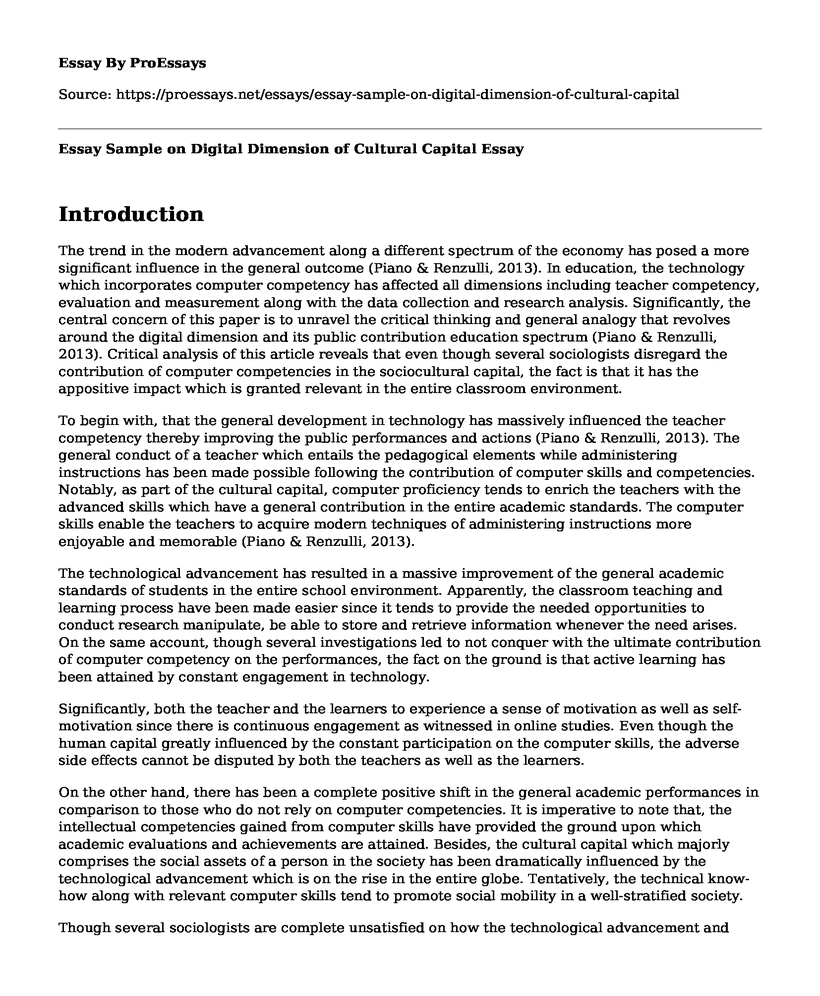Introduction
The trend in the modern advancement along a different spectrum of the economy has posed a more significant influence in the general outcome (Piano & Renzulli, 2013). In education, the technology which incorporates computer competency has affected all dimensions including teacher competency, evaluation and measurement along with the data collection and research analysis. Significantly, the central concern of this paper is to unravel the critical thinking and general analogy that revolves around the digital dimension and its public contribution education spectrum (Piano & Renzulli, 2013). Critical analysis of this article reveals that even though several sociologists disregard the contribution of computer competencies in the sociocultural capital, the fact is that it has the appositive impact which is granted relevant in the entire classroom environment.
To begin with, that the general development in technology has massively influenced the teacher competency thereby improving the public performances and actions (Piano & Renzulli, 2013). The general conduct of a teacher which entails the pedagogical elements while administering instructions has been made possible following the contribution of computer skills and competencies. Notably, as part of the cultural capital, computer proficiency tends to enrich the teachers with the advanced skills which have a general contribution in the entire academic standards. The computer skills enable the teachers to acquire modern techniques of administering instructions more enjoyable and memorable (Piano & Renzulli, 2013).
The technological advancement has resulted in a massive improvement of the general academic standards of students in the entire school environment. Apparently, the classroom teaching and learning process have been made easier since it tends to provide the needed opportunities to conduct research manipulate, be able to store and retrieve information whenever the need arises. On the same account, though several investigations led to not conquer with the ultimate contribution of computer competency on the performances, the fact on the ground is that active learning has been attained by constant engagement in technology.
Significantly, both the teacher and the learners to experience a sense of motivation as well as self-motivation since there is continuous engagement as witnessed in online studies. Even though the human capital greatly influenced by the constant participation on the computer skills, the adverse side effects cannot be disputed by both the teachers as well as the learners.
On the other hand, there has been a complete positive shift in the general academic performances in comparison to those who do not rely on computer competencies. It is imperative to note that, the intellectual competencies gained from computer skills have provided the ground upon which academic evaluations and achievements are attained. Besides, the cultural capital which majorly comprises the social assets of a person in the society has been dramatically influenced by the technological advancement which is on the rise in the entire globe. Tentatively, the technical know-how along with relevant computer skills tend to promote social mobility in a well-stratified society.
Though several sociologists are complete unsatisfied on how the technological advancement and computer competencies contribute to the sociological and cultural capital, the fact is that several attributes and skills are aligned to the computer competencies. Similarly, the general student's characteristics that contribute to the teacher's expectations are generally equated to the computer competencies and knowledge acquired therein. Significantly, the students with computer literacy and skills often show a higher degree of the cultural capital in the entire classroom environment in comparison to their counterparts with without such skills (Piano & Renzulli, 2013).
Useful measurement and evaluation have been propagated by the computer competencies as students with such expertise tend to portray a higher level of performance in various tasks allocated. Conversely, computer skills take centre stage in the modern society as it forms the hub of research along with both theoretical and empirical arguments has poised a significant influence in the general social capital impact to all the stakeholders in the educational set up (Piano & Renzulli, 2013).
References
Piano, M., & Renzulli, L. A. (2013). Digital dimension of cultural capital: The (in) visible advantages for students who exhibit computer skills. Sociology of Education, 86(2), 124-138.
Cite this page
Essay Sample on Digital Dimension of Cultural Capital. (2022, Nov 06). Retrieved from https://proessays.net/essays/essay-sample-on-digital-dimension-of-cultural-capital
If you are the original author of this essay and no longer wish to have it published on the ProEssays website, please click below to request its removal:
- Making Successful College Students
- Electric Cars Will Be the Future of America Essay
- Auntie, I'm Fighting for My Masters Degree! - Paper Example
- Essay Example on Operational Definition of Behavior: A Must in School Settings
- Essay Example on Cyberbullying: Combatting Harassment in the Digital Age
- Essay Example on Amazon: Disrupting E-Commerce, AI, Cloud, and Digital Streaming
- Paper on Peer Relationships: A Guide to Social-Emotional Enhancement







